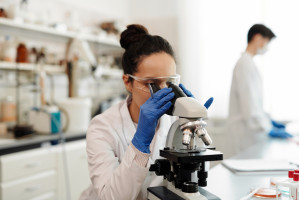
Researchers at Bar-Ilan University have unveiled a technology that promises to improve cancer treatment decisions based on a patient's biopsy.
Funded by the Israel Cancer Association, the pioneering biological research and development measures changes in immune system cells adjacent to cancer cells, providing crucial insights into the patient's immune response and potentially enhancing the effectiveness of immunotherapy.
Immunotherapy represents a targeted approach to cancer treatment, harnessing the body's own immune system to identify and eliminate cancer cells. Unlike traditional chemotherapy, which can have widespread effects on healthy cells, immunotherapy offers a more precise and targeted treatment option.
The research, published in the scientific journal RNA, marks the first time that a direct measurement of the interaction between immune cells and cancer cells from a patient's biopsy has been achieved.
This development opens new avenues for tailoring treatments to individual patients and improving outcomes.
"Cancer cells have the ability to manipulate immune cells, evading the body's natural defences," explains Dr. Shahar Alon, lead researcher at Bar-Ilan University's Faculty of Engineering. "By quantifying the molecular changes that occur when immune cells encounter cancer cells, we gain a deeper understanding of this complex interplay."
Using advanced scanning techniques developed by Dr. Alon's research group, the team examined how immune cells express genes differently when in proximity to cancer cells. They found that specific types of immune cells exhibit distinct genetic signatures when near cancerous tissue.
"The analysis revealed dozens of genes that are uniquely expressed in immune cells that interact with cancer cells," says Dr. Alon. "Notably, CD8 T immune cells, known for their ability to directly bind and eliminate cancer cells, showed a higher level of gene activation compared to CD4 T cells."
This innovative approach to sequencing biopsies offers a powerful tool for identifying genes involved in the immune response to cancer. By assessing the degree of immune system activation in individual patients, clinicians can make more informed decisions about immunotherapy treatments, ultimately improving patient outcomes.
Moshe Bar Haim, CEO of the Israel Cancer Association, emphasises the global significance of this research: "Research knows no boundaries, and every breakthrough has the potential to benefit patients worldwide. This new understanding of the immune system's response to cancer cells holds promise for more effective treatments and higher recovery rates."
Source: Bar-Ilan University
We are an independent charity and are not backed by a large company or society. We raise every penny ourselves to improve the standards of cancer care through education. You can help us continue our work to address inequalities in cancer care by making a donation.
Any donation, however small, contributes directly towards the costs of creating and sharing free oncology education.
Together we can get better outcomes for patients by tackling global inequalities in access to the results of cancer research.
Thank you for your support.